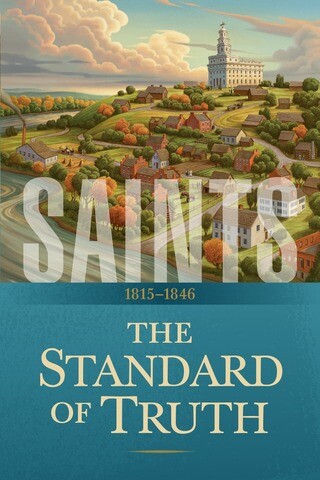The following is an excerpt from theChurch's new groundbreaking history, Saints: The Standard of Truth. Read it for free through the Gospel Library app and at saints.lds.org or buy a hard copy to own at Deseret Book.
After losing his first child; nearly losing his wife, Emma; and losing the 116 manuscript pages of the Book of Mormon, Joseph Smith reached a dark period of his life. But even during this time, the Lord did not abandon him.
When Joseph returned to Harmony in the summer of 1828, Moroni appeared to him again and took the plates away. “If you are sufficiently humble and penitent,” the angel said, “you will receive them again on the twenty-second of September.”1
Darkness clouded Joseph’s mind.2 He knew he had been wrong to ignore God’s will and trust Martin with the manuscript. Now God no longer trusted him with the plates or the interpreters. He felt like he deserved any punishment the heavens sent his way.3
Weighed down with guilt and regret, he went to his knees, confessed his sins, and pleaded for forgiveness. He reflected on where he had gone wrong and what he could do better if the Lord let him translate again.4
One day in July, as Joseph was walking a short distance from his house, Moroni appeared to him. The angel handed him the interpreters, and Joseph saw a divine message in them: “The works, and the designs, and the purposes of God cannot be frustrated, neither can they come to naught.”5
The words were reassuring, but they soon gave way to reproof. “How strict were your commandments,” the Lord said. “You should not have feared man more than God.” He commanded Joseph to be more careful with sacred things. The record on the gold plates was more important than Martin’s reputation or Joseph’s desire to please people. God had prepared it to renew His ancient covenant and teach all people to rely on Jesus Christ for salvation.
The Lord urged Joseph to remember His mercy. “Repent of that which thou hast done,” He commanded, “and thou art still chosen.” Once again, He called Joseph to be His prophet and seer. Yet He warned him to heed His word.
“Except thou do this,” He declared, “thou shalt be delivered up and become as other men, and have no more gift.”6
That fall, Joseph’s parents traveled south to Harmony. Nearly two months had passed since Joseph left their home in Manchester, and they had heard nothing from him. They worried the summer’s tragedies had devastated him. In a matter of weeks, he had lost his first child, nearly lost his wife, and lost the manuscript pages. They wanted to make sure he and Emma were well.
Less than a mile from their destination, Joseph Sr. and Lucy were overjoyed to see Joseph standing in the road ahead of them, looking calm and happy. He told them about losing the confidence of God, repenting of his sins, and receiving the revelation. The Lord’s rebuke had stung him, but like prophets of old he wrote the revelation down for others to read. It was the first time he had ever recorded the Lord’s word to him.
Joseph also told his parents that Moroni had since returned the plates and interpreters. The angel seemed pleased, Joseph recounted. “He told me that the Lord loved me for my faithfulness and humility.”
The record was now safely stowed in the house, hidden in a trunk. “Emma writes for me now,” Joseph told them, “but the angel said that the Lord would send someone to write for me, and I trust that it will be so.”7
Lead image from Wikimedia Commons
The Standard of Truth is the first book in Saints, a new, four-volume narrative history of The Church of Jesus Christ of Latter-day Saints. Fast-paced and meticulously researched, Saints recounts true stories of Latter-day Saints across the globe and answers the Lord's call to write history "for the good of the church, and for the rising generations" (Doctrine and Covenants 69:0).



